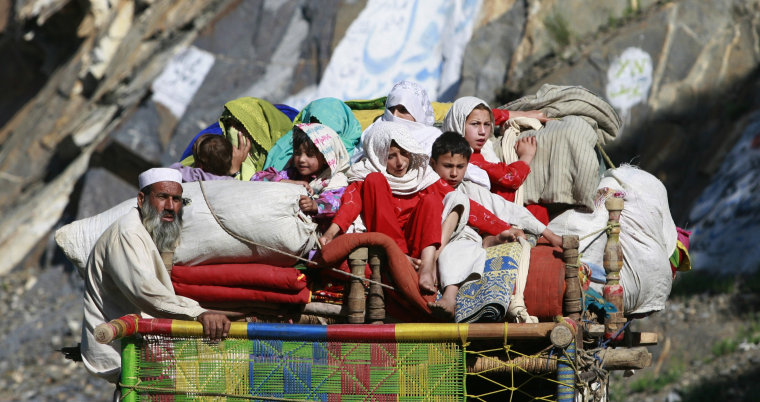As Pakistani commandos took on Taliban fighters and civilians caught in the middle continued to flee, Pakistan's president appealed to the world on Tuesday to help more than 1 million people facing "a human catastrophe."
Visiting the United Nations, and with U.N. Secretary-General Ban Ki-moon next to him, President Asif Ali Zardari said the U.N. chief was going to join in an appeal for humanitarian assistance.
"We would like to appeal of the United Nations to help us ... to take responsibility of the displaced people, the affectees of the war — not only in the camps but then to rehabilitate them back because we realize that they're losing their crop ... their earnings, ... their livelihood, and they're losing their homes," Zardari said. "So we want the world to help us in rehabilitating them back in their own homes again."
Ban said the U.N. was ready to provide humanitarian assistance to Pakistanis displaced by the conflict, but he said he urged Zardari "first and foremost" to protect human lives during the military operation.
Refugee plight could sap support
The plight of those refugees could sap public support for the kind of sustained action against an increasingly interlinked array of Islamist extremists that the cash-strapped country's Western backers want to see.
An army officer said Tuesday that the total number displaced in the northwest — including some half-million who fled a separate offensive in the Bajur border region last year — had risen to 1.3 million.
The U.N. has registered 501,000 refugees from the latest fighting. About 73,000 are living in hot, tented camps established just south of the war zone. Officials acknowledge that many more have taken refuge with relatives without registering with the authorities.
An Associated Press reporter who visited three camps over the last two days found them hot and dusty, but provided with food, shelter and basic medical facilities available.
Zardari came to New York from Washington where he met with President Barack Obama and Afghan President Hamid Karzai for unprecedented three-way talks to advance Washington's efforts to wipe out the Taliban and al-Qaida operations and safe havens along their common border.
Commandos go behind Taliban lines
Earlier Tuesday, helicopters dropped Pakistani commandos into a Taliban stronghold in the Swat Valley, pressing ahead with an offensive the army said had killed more than 750 militants.
Despite claims of success in an operation that began after heavy U.S. pressure, the army said it had yet to start operations in the region's main town of Swat, where witnesses say Taliban insurgents are in control and preparing for what could be bloody door-to-door fighting.
Farther south, a suspected U.S. missile attack flattened a house and killed at least eight people in another militant bastion near the Afghan border, officials said, in the latest in a series of attacks that have strained U.S. and Pakistani ties.
Choppers placed troops on "search and destroy" missions in the remote Piochar area in the upper reaches of the Swat Valley, army spokesman Maj. Gen. Athar Abbas said. Officials have identified Piochar as the rear-base of an estimated 4,000 Taliban militants. It is seen as a possible hiding place of Swat Taliban chief Maulana Fazlullah.
Abbas said the army had yet to begin the "hardcore urban fight", but Interior Minister Rehman Malik expressed optimism the battle might prove short.
"The way they (militants) are being beaten, the way their recruits are fleeing, and the way the Pakistan army is using its strategy, God willing the operation will be completed very soon," he said.
Pakistani authorities launched a full-scale assault on Swat and surrounding districts last week after the Taliban pushed out from the valley on the back of a now-defunct peace deal and extended their control to areas just 60 miles from the capital, Islamabad.
It has been praised by American officials, who had been insisting Islamabad must eliminate safe havens used by militants to undermine the pro-Western governments in both Afghanistan and Pakistan.
The Pakistani army said Tuesday that troops backed by artillery and airstrikes had killed 751 militants in Swat and neighboring districts so far. It was unclear how it calculated that figure, which couldn't be independently verified. Abbas said the army lost 29 soldiers and had no reports of civilian casualties. Accounts from refugees fleeing the fighting suggest there has been significant loss of innocent life.
Pakistani politics
Lawmakers have criticized the government for doing too little to help residents flee. Many had to walk to safety because they couldn't find space in overloaded private buses and cattle trucks.
On Tuesday, Syed Allahuddin, a parliamentarian from the ruling party, accused authorities of indifference to the plight of the thousands still in the war zone.
"The situation is very bad. The people are stranded over there. They do not have foodstuffs and other facilities" such as electricity that has been cut off for over a week, he said.
He said he doubted the army would be able to avoid significant civilian casualties.
But there was also outspoken support for the government from among the opposition — including a call for the crackdown to go far beyond Swat.
"Wherever there are extremist sleeper cells, it needs to be a blitz action simultaneously to take them out," said Marvi Memon, an opposition lawmaker. "It's us versus the extremists and the entire country needs to galvanize support for the armed forces, for the government."
